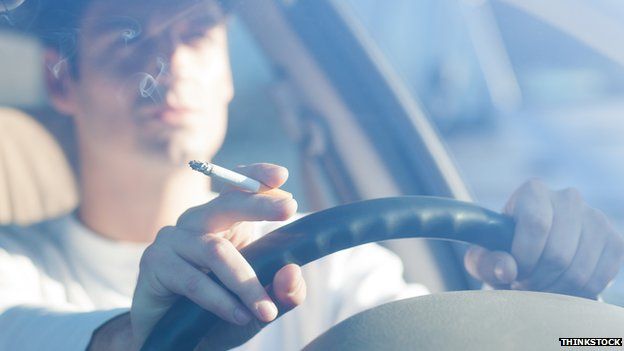Enforcing smoking ban in cars with children 'difficult'
- Published

Enforcing a smoking ban in cars with children present could prove "difficult", the Law Society of Scotland has said.
The society was giving evidence on a bill that would make smoking in cars when children are present illegal.
Police Scotland also raised concerns about being the sole enforcers of the proposed legislation.
The force said while they support the bill, their priority was reducing road deaths.
The Scottish government said it supported the principle of the bill and would work to make sure the legislation was "effective and enforceable".
Alison Britton, convener of the Law Society's health and medical law committee, told MSPs the society supported the principle behind the bill, but was concerned about how it would work in practice.
She also recommended that the driver should be legally responsible for ensuring no-one smokes in the vehicle in the presence of children, rather than the smoker.
She said: "Evidence is going to be so difficult. Since this is such an important component part of smoking cessation strategy, we have to make sure we're as resourceful as we possibly can be."
In written evidence submitted to the Scottish Parliament's health and sport committee, Police Scotland said it questioned "the decision to make the police solely responsible for enforcement".
Speaking to the health and sport committee, Assistant Chief Constable Bernard Higgins said: "One of our key priorities is around reducing road deaths and reducing persons that are seriously injured on Scotland's roads.
"Last year, fiscal year ending 31 March, we had sadly 191 people killed on Scotland's roads. As I understand it, smoking was not a contributory factor in any of these fatal road accidents, so while there is absolutely clear health benefits for it, in terms of reducing the number of people killed on Scotland's roads it wouldn't be something that we would necessarily see as having a great impact.
"Speeding, mobile phones, seat belts, drink-driving are the clear causal factors for fatal road accidents and to reduce road accidents that's what we would wish to continue to target."
He went on to suggest that local authorities and other agencies could share some responsibility for enforcing the ban.
Margaret Wallace, from Stirling Council, said she thought local authorities could play a role in upholding the legislation if the offence was committed in a parked car.
She said: "I think our view is that it should be a partnership approach. That Police Scotland should be the enforcing body, but it's actually about different partners playing their part as well. It's about wider intervention, prevention, education and enforcement, essentially for the people who aren't responsible.
"I think its more about cars that are actually stationary from a council perspective, obviously because that's more practical for us."
But William Hamilton, from Glasgow City Council, raised concerns about how environmental health officers could realistically uphold the proposed law.
He said: "I take the point about the stationary vehicles but in reality we don't have the people on the ground, on the street, to the same extent that the police do. So intervening with a stationary vehicle - yes it's conceivable, but in terms of the numbers involved, I really can't imagine it happening to any meaningful extent."
Changed behaviour
Earlier, the committee heard from Simon Clark from the Freedom Organisation for the Right to Enjoy Smoking Tobacco (Forest), who also said the legislation would be difficult to enforce and was unnecessary.
He said: "I think over the last 10, 15, 20 years, huge numbers of smokers have actually changed their behaviour because they realise it's wrong.
"And the reality is very, very few people still smoke in a car when children are present and I would like to think that we could give credit to smokers for having changed their behaviour, for having become increasingly considerate to people who are are around them, children in particular."
The Smoking Prohibition (Children in Motor Vehicles) (Scotland) Bill was introduced by Lib Dem MSP Jim Hume.
Public Health Minister Maureen Watt said: "It is important that we all work together to make sure the legislation is effective and enforceable. We will continue to work closely with Police Scotland and other organisations.
"The purpose of this legislation is ultimately to achieve culture and behaviour change. This cannot be done by enforcement alone - legislation of this nature also has the potential to act as a deterrent."
- Published16 June 2015
- Published11 February 2015
- Published16 December 2014